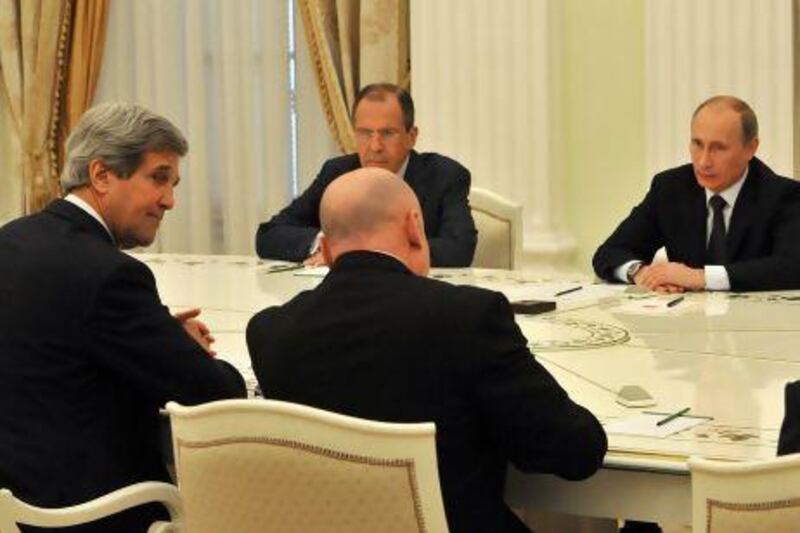MOSCOW // The US secretary of state, John Kerry, yesterday argued the US case to Russian president Vladimir Putin for Russia to take a tougher stance on Syria at a time when Israel's recent air strikes against the beleaguered Mideast nation have added an unpredictable factor to the talks.
Mr Kerry, who met Mr Putin at the Kremlin, said the US and Russia share common interests: Stability in the region, not wanting to see extremism grow and hopes for a peaceful transition in Syria.
"It is my hope that today we'll be able to dig into that a little bit and see if we can find some common ground," the secretary said going into the talks.
Mr Putin, through an interpreter, said that he looked forward to working together with US leader on the problems of today. Mr Kerry arrived in Moscow earlier yesterday for the high-level talks with Russia, which is the most powerful ally of Syrian president Bashar Al Assad's regime.
US officials had said that Mr Kerry hoped to change Moscow's thinking on Syria with two new angles: American threats to arm the Syrian rebels and evidence of chemical weapon attacks by the Assad regime.
Israel's willingness to hit Syrian targets it sees as threats to its own existence has complicated the US administration's internal debate over what to do about Syria.
On the weekend, Israeli warplanes targeted what Israel claimed were caches of Iranian missiles bound for Hizbollah, the Lebanon-based terror group. Such weapons would allow Hizbollah to strike Tel Aviv and as far as southern Israel from inside Lebanese territory.
Israel's actions put Damascus and Moscow on notice that the US and its allies may not wait for an international green light to become more actively engaged in the Syrian conflict. The administration said last week it was rethinking its opposition to arming the Syrian rebels or taking other aggressive steps to turn the tide of the two-year-old civil war toward the rebels.
At the same time, Israeli involvement in the war carries risks. Instead of prodding Russia into calling for Mr Al Assad's ouster, it could bring greater Arab sympathy for the leader and prompt deeper involvement from Iran and Hizbollah, actors committed as much to preserving Mr Al Assad as to fighting the Jewish state.
Although Israel hasn't officially acknowledged it carried out the air strikes, Syrian officials on Monday were blaming Israel, calling them a "declaration of war" that would cause the Jewish state to "suffer".
Russia, alongside China, has blocked US-led efforts three times at the United Nations to pressure Mr Al Assad into stepping down and US officials are hoping Syria's behaviour could shift Russia's stance.
"We have consistently, in our conversations with the Russians and others, pointed clearly to Mr Al Assad's behaviour as proof that further support for the regime is not in the interest of the Syrian people or in the interest of the countries that have in the past supported Mr Al Assad," White House spokesman Jay Carney said.
A spokesman for a Palestinian militant group in Syria said yesterday it had received a nod from Mr Al Assad's regime to attack Israel following the back-to-back Israeli air strikes over the weekend. Anwar Raja of the Damascus-based Popular Front for the Liberation of Palestine-General Command (PFLP-GC) says the regime has given "a green light" for the group "to attack Israeli targets" from the Syrian-controlled part of Golan Heights. Mr Raja did not elaborate on how the alleged approval was conveyed to PFLP-GC fighters but he stressed that there was no official government note.
Meanwhile, a Syrian rebel group yesterday detained four UN peacekeepers on patrol on the Golan Heights in a tense area that separates Syria and Israel.
It was the second time in two months that unarmed UN military observers have been taken captive by the Yarmouk Martyrs Brigades, and illustrated again the vulnerability of the UN peacekeeping mission amid the spillover from the war in Syria, which is now in its third year. The separation zone on the Golan Heights is supposed to be free of any armed groups but in recent months it has been the scene of fighting between Syrian government forces and rebel fighters. Kieran Dwyer, spokesman for the UN peacekeeping department, said the four peacekeepers, all from the Philippines, were taken by an armed group near Jamla and "efforts are underway to secure their release now." UN spokesman Martin Nesirky said later that the Yarmouk brigade had claimed responsibility.
* With additional reports from Agence-France Presse and Reuters





